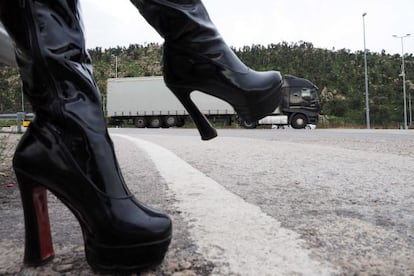The Spanish border town at the center of the European sex industry
Fining La Jonquera’s prostitutes has done little to reduce their numbers


Six months, five months, four months; 24 years, 27 years, 25 years, 28 years; Romanian, Romanian, Romanian… The few women who agree to talk to EL PAÍS are very similar: they are all young, they are all from Eastern Europe, and they have all been working as prostitutes in La Jonquera, the town bordering Spain’s Catalan border with France, for several months.
Apip-Acam, a foundation that works with victims of sexual exploitation, describes the town as “one of the main centers of the prostitution industry and the trafficking of women for sexual exploitation in Europe.” In a recent report, it documents more than 100 women plying their trade on the industrial estates, roundabouts and streets of La Jonquera, a twofold increase since 2008.
“I get here around 12, I’m around for four or five hours, and I can earn up to €500,” says one woman who refuses to be photographed or give her name.
The youngest tend to be Romanian or Bulgarian, “and all are subject to extreme control by small family clans”
On a different nearby roundabout, another young woman explains that many of the men looking for sex here are French, either lorry drivers on their way through, or who live in towns just across the border. The average price for sex is €50.
The local authorities have attempted to limit the sex trade – which exists in a legal limbo in Spain, being neither banned nor regulated – here by issuing fines to both the women and their clients, which many prostitutes say has done nothing to reduce the trade, and has instead led to women servicing men in nearby fields or woods. The ground in them has become littered with used condoms, many of them issued by the Catalan regional health department to try to reduce sexually transmitted diseases.
La Jonquera was one of the first Spanish municipalities to take this approach, in 2009. The effect was immediate, and many women left for other areas. But they have slowly drifted back. Few women pay their fines, while men caught by the police usually pay on the spot. “The fines are not about raising money; they are meant to dissuade, the idea is to eliminate demand,” says La Jonquera Mayor Sònia Martínez.
The local authorities, along with Apip-Acam volunteers, are now trying to work more closely with the prostitutes. Many women here insist that they are not working for pimps or being exploited by trafficking gangs, and that this is the only way they can make a living.
Of the 111 women working in the open in La Jonquera that Apip-Acam has contacted, only six have signed up to a program for victims of trafficking and sexual exploitation. More than half are aged under 25, and around a quarter are aged between 25 and 30. More than 80 percent have young children. The youngest tend to be Romanian or Bulgarian, “and all of them are subject to extreme control and domination by small family clans,” says Apip-Acam’s report.
“La Jonquera is a showcase for criminal gangs who traffic women for sexual exploitation. Recently, many women have been removed from the roadside, which has led to their dispersion into a much wider and more remote area, worsening their exposure to new forms of extortion,” concludes the Apip-Acam report.
Tu suscripción se está usando en otro dispositivo
¿Quieres añadir otro usuario a tu suscripción?
Si continúas leyendo en este dispositivo, no se podrá leer en el otro.
FlechaTu suscripción se está usando en otro dispositivo y solo puedes acceder a EL PAÍS desde un dispositivo a la vez.
Si quieres compartir tu cuenta, cambia tu suscripción a la modalidad Premium, así podrás añadir otro usuario. Cada uno accederá con su propia cuenta de email, lo que os permitirá personalizar vuestra experiencia en EL PAÍS.
¿Tienes una suscripción de empresa? Accede aquí para contratar más cuentas.
En el caso de no saber quién está usando tu cuenta, te recomendamos cambiar tu contraseña aquí.
Si decides continuar compartiendo tu cuenta, este mensaje se mostrará en tu dispositivo y en el de la otra persona que está usando tu cuenta de forma indefinida, afectando a tu experiencia de lectura. Puedes consultar aquí los términos y condiciones de la suscripción digital.








































